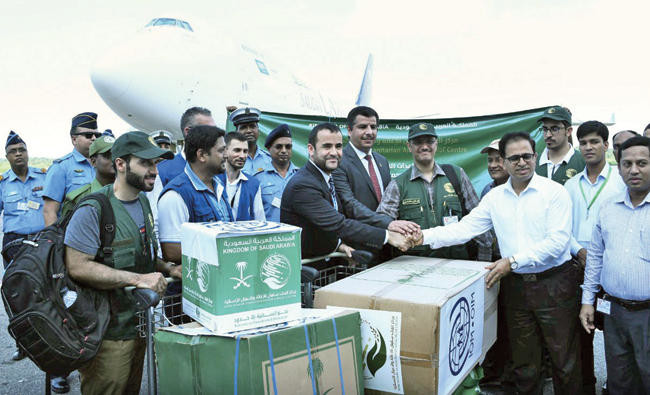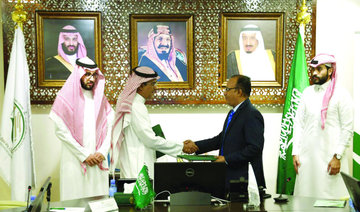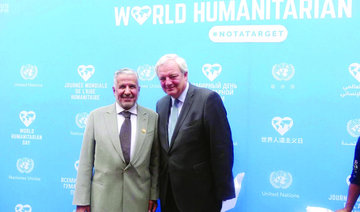RIYADH: The King Salman Humanitarian Aid and Relief Center (KSRelief), launched by King Salman in 2015, has saved “millions of people,” said its General Supervisor Abdullah Al-Rabeeah.
KSRelief has improved the lives of people in need in numerous countries, including Yemen and Syria.
King Salman on Tuesday ordered the payment of $15 million in aid for Rohingya refugees fleeing genocide in Myanmar.
The announcement came following a meeting of the Saudi Cabinet, which renewed a call for the international community to take urgent action to end the organized violence and allow Myanmar’s Muslim minority their basic human rights.
“The Kingdom, represented by KSRelief, has saved millions of people, victims of conflicts and crises worldwide, without discrimination in terms of their religion, race or color,” said Al-Rabeeah.
He added that the level of development and humanitarian assistance provided by the Kingdom, as a percentage of gross domestic product (GDP), exceeds the target set by the UN.
Al-Rabeeah was speaking in Washington at a symposium hosted by the National Council on US-Arab Relations and a committee for US-Gulf partnerships.
He said KSRelief, despite its recent establishment, has implemented 231 projects in 38 countries via 108 partnerships with the UN, international and local organizations.
Al-Rabeeah added that war-torn Yemen is suffering from poor infrastructure and poor health services, and is in dire need of humanitarian aid in the areas of food, health care and child malnutrition.
He cited the situation regarding humanitarian funding for Yemen by the international community, with only 42 percent of the UN’s target for 2017 — $976.5 million of $2.3 billion — met so far.
Al-Rabeeah said the Kingdom is one of the most active countries in the world in responding to the UN appeal for 2017, with its funding amounting to $221.9 million. The Kingdom gave Yemen a total of $8.27 billion between 2015 and 2017, he added.
Al-Rabeeah said the Kingdom responded to appeals by the World Health Organization (WHO) and UNICEF to fight cholera in Yemen by providing $66.7 million upon the directives of Crown Prince Mohammed bin Salman.
KSRelief implemented 103 projects benefiting almost 32 million women, with total funding of more than $157 million, he added.
These projects included 68 initiatives in the fields of education, protection, food security, health, water and environmental sanitation for Yemeni women.
Projects for children in Yemen focused on protection, rehabilitation, food, nutrition, health and environmental sanitation.
KSRelief implemented 116 projects for children worldwide, benefiting more than 60 million of them.
The center last week signed contracts with hospitals in Yemen to treat about 700 victims of the conflict.
It also freed and rehabilitated 40 Yemeni children who had previously been conscripted by Houthi militias. The children were returned to school and reintroduced to their peers.
For one month, they will receive psychological, educational, social and sports courses supervised by qualified psychologists, according to international standards for reintegration programs.
These children were forced by Houthi militias to take part in fighting and supply them with ammunition and food.
According to Yemeni government estimates, more than 10,000 children have been conscripted by the Houthis.
KSRelief is also supporting the Syrian people by coordinating with the Saudi National Campaign (SNC), which is offering humanitarian support including providing medical services via specialized clinics at Zaatari refugee camp in Jordan.
A Kingdom-wide fundraising campaign for people displaced by the war in Syria, including those evacuated from east Aleppo, was launched last December, and has received an overwhelming response.
Saudi Arabia is one of the biggest donors to UN relief campaigns for Syria, and has an ongoing aid program for refugees and those internally displaced.
Humanitarian work puts Saudi Arabia at forefront of philanthropy
Humanitarian work puts Saudi Arabia at forefront of philanthropy

Guests of the Custodian of the Two Holy Mosques Program arrive in Madinah

- The third batch of the guests include 250 people from African countries, with the Egyptian delegation of 22 Umrah performers arriving as ahead
- The program is set to host a total of 1,000 visitors from 66 countries divided into four batches for this year, as approved by King Salman
MADINAH: The third batch of participants in the Custodian of the Two Holy Mosques’ Program for Umrah and Visitation for Islamic year 1446 began arriving in Madinah on Wednesday.
Their 10-day visit to the Kingdom includes prayers at the Prophet’s Mosque, performing Umrah, and touring historical and cultural landmarks as well as museums in Madinah and Makkah.
Officials from the Saudi Ministry of Islamic Affairs, Dawah, and Guidance welcomed the program’s guests at Prince Mohammad Bin Abdulaziz International Airport in Madinah.
The Egyptian delegation, comprising 22 Umrah performers, was the first to arrive among the third batch, which includes 250 people from 18 African countries: Egypt, Morocco, Tunisia, Algeria, Mali, Senegal, Cameroon, Chad, Kenya, Nigeria, Uganda, South Africa, Madagascar, Ethiopia, Mauritius, Guinea, Mozambique, and Mauritania.
The program is set to host a total of 1,000 visitors from 66 countries divided into four batches for this year, as approved by King Salman.
Crown prince to Trump: Saudi Arabia seeks to push US investments to $600bn during second term

RIYADH: Saudi Arabia intends to broaden its trade and investment in the United States to at least $600 billion over the next four years, the Saudi Press Agency reported early on Thursday.
Saudi Arabia’s Crown Prince Mohammed bin Salman told US President Donald Trump about the Kingdom's plan during a phone conversation late Wednesday, the report said.
With Trump's vow to carry out wide-ranging reforms in the world's largest economy, the Kingdom seeks to participate in opportunities for partnership and investment, SPA quoted the crown prince as saying.
The report did not indicate any details of the planned investments.
The two leaders also discussed ways for cooperation between their countries to promote peace, security and stability in the Middle East, in addition to enhancing bilateral cooperation to combat terrorism.
Trump assumed office on Monday and said he would restore American prestige and rebuild its economic power.
Trump made the Kingdom his first foreign visit during his first term and the countries signed a number of investment agreements worth about $400 billion.
The crown prince said in 2018 that part of the “armaments will be manufactured in Saudi Arabia, so it will create jobs in America and Saudi Arabia, good trade, good benefits for both countries and also good economic growth. Plus, it will help our security”.
Trump campaigned on his America First policy which seeks to prioritize the US economy and American citizens.
He signed an executive order on Monday to establish “a robust and reinvigorated trade policy that promotes investment and productivity, enhances our Nation’s industrial and technological advantages, defends our economic and national security”.
Prince Mohammed conveyed his and King Salman’s congratulations to Trump upon his return to the Oval Office and the Saudi leaders wished the American people further progress and prosperity.
Trump expressed his thanks to the king and crown prince for their congratulations, stressing his keenness to work with them on everything that would serve the common interests of both nations.
Trump was well received in the Kingdom in 2017 and attended a number of events in Riyadh with the king and crown prince. King Salman presented the US president with the Collar of Abdulaziz Al Saud, the Kingdom’s top civilian honor.
The king hosted a state dinner for Trump, where both took part in a traditional war dance ahead of the banquet.
The pair also opened the Global Center for Combating Extremist Ideology, part of a broad initiative to tackle the root causes of extremism and stop terror financing.
Saudi Arabia condemns Israeli attack on West Bank’s Jenin

RIYADH: Saudi Arabia has condemned Israeli forces’ attack in the occupied West Bank’s Jenin area, the Saudi Press Agency said early Thursday.
Gunfire and explosions rocked Jenin on Wednesday, an AFP journalist reported, as the Israeli military kept up a large-scale raid for a second day.
The operation, launched just days after a ceasefire paused more than a year of fighting in Gaza, has left at least 10 Palestinians dead, according to Palestinian health authorities.
Israeli officials have said the raid is part of a broader campaign against militants in the West Bank, citing thousands of attack attempts since the Gaza war erupted in October 2023.
“The Kingdom renews its demand for the international community to assume its responsibilities towards halting Israeli violations of relevant international laws and treaties,” a Saudi foreign ministry statement read.
Saudi Arabia warned that the continuation of these violations might cause the fighting and chaos to return to occupied Palestinian territories, thus risking the security and safety of civilians and undermining chances of peace in the region.
Saudi Arabia announces new national policy to eliminate forced labor

- Osama Ghanem Alobaidy: This policy adopted by the Kingdom will ensure the protection of persons living or working in the Kingdom and create a safe working environment
- Sattam Alharbi: It demonstrates our collective commitment to creating a safe environment for everyone living and working in our country, ensuring their rights are protected
RIYADH: Saudi Arabia has introduced its National Policy for the Elimination of Forced Labor, the Ministry of Human Resources and Social Development announced.
“This policy adopted by the Kingdom will ensure the protection of persons living or working in the Kingdom and create a safe working environment,” Osama Ghanem Alobaidy, adviser and professor of law at the Institute of Public Administration in Riyadh, told Arab News.
In 2021, Saudi Arabia, became the first GCC country to ratify the International Labour Organization’s Protocol of 2014 to the Forced Labour Convention, bringing it in line with international standards to eliminate forced labor.
“This shows the Kingdom’s commitment to improve and protect the rights of individuals living or working in the Kingdom,” Alobaidy said.
The newly introduced policy aims to eliminate forced labor through prevention and protection measures.
According to the Ministry of Human Resources and Social Development, it will also strengthen national, regional and international coordination to integrate better efforts to combat forced labor.
Deputy Minister for Control and Development of the Work Environment Sattam Alharbi said: “The introduction of the National Policy for the Elimination of Forced Labor is an important milestone for the Kingdom of Saudi Arabia.
“It demonstrates our collective commitment to creating a safe environment for everyone living and working in our country, ensuring their rights are protected,” Alharbi said.
“The introduction of the national policy also builds on our ongoing work to safeguard employees’ rights, in collaboration with global and local partners.”
The national policy also includes victim-focused initiatives that will enhance care, support and access to justice.
It will support the implementation of measures to provide legal, social and economic support for forced labor victims, aiding their recovery and protecting against the risk of re-victimization.
This new policy is not the first of its kind for the Kingdom. Saudi Arabia has been implementing multiple measures to protect the rights of its workforce.
“The Kingdom already has a set of laws, rules and regulations addressing this matter even before the adoption of this policy,” Alobaidy said.
In October of 2024, Saudi Arabia’s Ministry of Human Resources and Social Development and the Insurance Authority launched an insurance service that would cover unpaid wages for up to six months and provide travel assistance for expatriates in the Kingdom in the case of private-sector defaults.
Alobaidy highlighted the multiple laws that the Kingdom has put in place to protect the workforce: “The law on trafficking of persons and the labor laws for example and regulations prohibit any forms of forced labor.”
Elaborating on Saudi Arabia’s decision to ratify the International Labour Organization’s Protocol of 2014 to the Forced Labour Convention, the professor said: “It is also commendable that the Kingdom took the lead among GCC countries in ratifying the protocol to the forced labor convention to eliminate forced labor.”
“The Kingdom’s adoption of this policy is welcome news to persons working or living in the Kingdom since it will ensure greater protection of their rights,” he said.
“This will enhance the work environment in the Kingdom in line with the Kingdom’s Vision 2030 objectives,” Alobaidy said.
Saudi ambassador receives UN Special Envoy to Syria in Riyadh

Saudi Ambassador to Syria Faisal Al-Mujfel received UN Special Envoy to Syria Geir Pedersen in Riyadh on Wednesday.
During the meeting, they discussed topics of mutual interest, the Saudi Press Agency reported.
Meanwhile, Saudi aid agency KSrelief’s Assistant Supervisor-General for Planning and Development Aqeel Al-Ghamdi recently met Ambassador of Gabon to Saudi Arabia Ibrahim Membourou in Riyadh.
The two sides discussed relief and humanitarian issues, as well as prospects for humanitarian work in Gabon.























